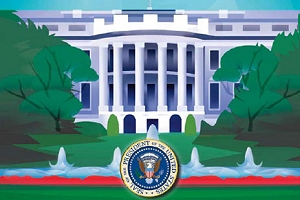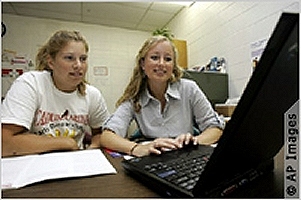America in context
U.S. Presidential Transitions

We often read or hear about turmoil before, during, or after elections around the world. An important characteristic of democracy in the United States, however, is the regularly recurring peaceful transfer of power from one president to the next. Americans know when the next presidential election will take place — the Tuesday after the first Monday in November every four years. And power will be transferred to the newly elected (or re-elected) president on January 20 of the following year.
In this issue of eJournal USA, as another U.S. presidential transition takes place, we’ve tried to present our readers with insight into this process, including some historical background.
Experts Stephen Hess, Kurt Campbell, and Martha Kumar discuss the transition process, its foreign policy implications, and the art of media relations. Another expert, John Burke, describes what happens when a president is re-elected, a different kind of transition.
Interviews with Democrat Richard Riley, Bill Clinton’s secretary of education, and Republican Stuart Holliday, a member of George W. Bush’s transition team, describe the process from the inside. Terry Good, former director of the White House’s Office of Records Management, provides a look at transitions from the viewpoint of civil servants who stay on and work for several consecutive administrations.
Sidebars and a photo gallery answer questions and present interesting facts about presidential transitions and inaugurations throughout U.S. history.
As a veteran of several transitions, Terry Good sums it up: “And so one cycle ends. Another begins. American democracy in action.”
Recently on America in context
The Young as Advisers to the Young
 Meet some young Americans who have taken time off before going on to graduate education or embarking on a career to help students from low-income families get a higher education.
Meet some young Americans who have taken time off before going on to graduate education or embarking on a career to help students from low-income families get a higher education.
International Student Enrollment at U.S. Colleges Breaks Records
 The number of non-U.S. students enrolled in U.S. higher education institutions during the 2007-2008 academic year jumped 7 percent to a record total of 623,805, according to a report from the Institute of International Education (IIE). First-time enrollments increased 10 percent in 2007-2008, following a similar 10 percent rise the previous year.
The number of non-U.S. students enrolled in U.S. higher education institutions during the 2007-2008 academic year jumped 7 percent to a record total of 623,805, according to a report from the Institute of International Education (IIE). First-time enrollments increased 10 percent in 2007-2008, following a similar 10 percent rise the previous year.
Population Changes Likely to Influence U.S. Election
 In 2008 the U.S. electorate is younger, better educated and more diverse than it was when the nation first elected President Bush in 2000, and these population shifts will affect the November 4 election and help shape America’s future political landscape, analysts say.
In 2008 the U.S. electorate is younger, better educated and more diverse than it was when the nation first elected President Bush in 2000, and these population shifts will affect the November 4 election and help shape America’s future political landscape, analysts say.